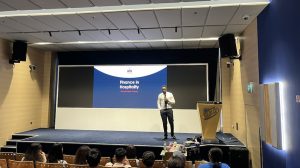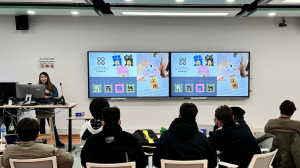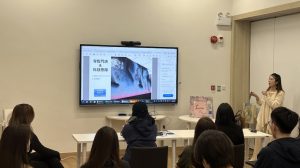World Tourism Organization (UNWTO) Secretary General Dr. Taleb Rifai has urged IFT students to prepare for what he calls a revolution in the travel industry.
Dr. Rifai made the comments in the keynote speech at a public seminar held on the IFT Mong-Há Campus on 17 October. Arranged by IFT, the seminar focused on the development of tourism in the Asia-Pacific region and its implications for demand for human resources in tourism and their education.
“Anyone who thinks they are going to be here, studying and receiving training, and then get a well-paid job, get good prospects of promotion, and go home at the end of the day, you are in the wrong place,” Dr. Rifai told the audience. “You are here to do something much bigger than that. You are here to change the world. You are in an industry that put smiles on the faces of people, an industry that brings optimism that the world so badly needs.”
The UNWTO head told the seminar a travel revolution was taking place. “Today, travel and tourism is the third-largest industry in the world,” he said. “In 2016, more than 1.2 billion international tourists crossed borders. That means 1 out of 6 people in the world made an international trip outside their home countries. Every day, US$3.2 billion is spent by tourists all around the world.”
Dr. Rifai said travel and tourism were important means of bringing people together. “The digital revolution and mobiles are connecting us virtually, but travel is making us live it,” he said. “We have become so connected to each other, and the world has become so much smaller.”
Dr. Rifai’s tenure as head of the UNWTO began in 2010 and is due to end in December. His successor will be Georgian Ambassador to Spain, Morocco, Algeria and Andorra Zurab Pololikashvili.
Education crucial
Another speaker at the seminar was UNWTO.Themis Foundation Executive Director Mr. Omar Valdez. The purpose of the foundation, based in Andorra, is to put the UNWTO education and training programme into action, helping UNWTO members come up with and put into effect education policies that improve the tourism industry, and make it more competitive and sustainable.
“We are convinced that education and vocational education are very important,” Mr. Valdez said, speaking on the sidelines of the seminar. He said education was the most important factor in making a competitive tourism destination.
Mr. Valdez said not all managers of tourist destinations needed master’s degrees, but many managers could benefit from training in specific areas. “This is especially true in small destinations, where the same person must perform different roles, from tourism strategic planning to promotion and marketing. It’s important for that person to access quality education or training that addresses specifically those needs,” he said. “That’s why training institutions like IFT are so important.”
IFT President Dr. Fanny Vong attended the seminar. Dr. Vong said the event was another outcome of cooperation by the Institute and UNWTO in promoting the development of the tourism and hospitality industries in Asia and the Pacific. She said the contributions of Dr. Rifai and Mr. Valdez “have a lot to do with where IFT is today”, helping to build its prominent international profile.
In 2013, IFT and the UNWTO signed a cooperation agreement to promote exchanges and training of tourism professionals. Last year, the IFT Library joined the UNWTO Depository Library Programme, a scheme to give the public greater access to UNWTO reports and publications. The IFT Library was the first academic library in Greater China to join the programme. The UNWTO and IFT have jointly staged seminars on tourism and an IFT graduate was offered a 12-month internship at the UNWTO headquarters in Madrid last year.
The IFT Global Centre for Tourism Education and Training, in partnership with the UNWTO, holds training programmes for officials from Asian countries. The centre was set up last year as the result of an agreement between the Macao SAR Government and the UNWTO. The agreement covers the enhancement of human capital for the tourism industry and the promotion of sustainable tourism in the Asia-Pacific region.
IFT was the first institution in the world accredited by the UNWTO.TedQual Certification System, run by the UNWTO.Themis Foundation, to certify the quality of tourism education. The Institute has 8 programmes leading to bachelor’s degrees certified by the system – more than any other institution of higher education in the world.











